英语中名词的用法
英语名词的用法
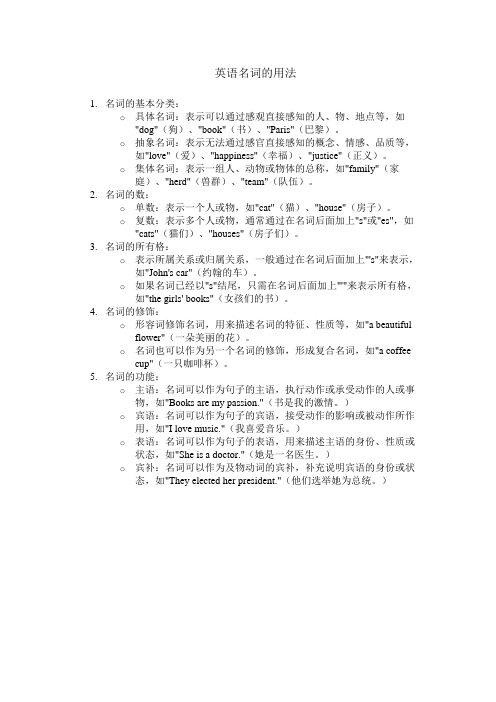
英语名词的用法1.名词的基本分类:o具体名词:表示可以通过感观直接感知的人、物、地点等,如"dog"(狗)、"book"(书)、"Paris"(巴黎)。
o抽象名词:表示无法通过感官直接感知的概念、情感、品质等,如"love"(爱)、"happiness"(幸福)、"justice"(正义)。
o集体名词:表示一组人、动物或物体的总称,如"family"(家庭)、"herd"(兽群)、"team"(队伍)。
2.名词的数:o单数:表示一个人或物,如"cat"(猫)、"house"(房子)。
o复数:表示多个人或物,通常通过在名词后面加上"s"或"es",如"cats"(猫们)、"houses"(房子们)。
3.名词的所有格:o表示所属关系或归属关系,一般通过在名词后面加上"'s"来表示,如"John's car"(约翰的车)。
o如果名词已经以"s"结尾,只需在名词后面加上"'"来表示所有格,如"the girls' books"(女孩们的书)。
4.名词的修饰:o形容词修饰名词,用来描述名词的特征、性质等,如"a beautiful flower"(一朵美丽的花)。
o名词也可以作为另一个名词的修饰,形成复合名词,如"a coffee cup"(一只咖啡杯)。
5.名词的功能:o主语:名词可以作为句子的主语,执行动作或承受动作的人或事物,如"Books are my passion."(书是我的激情。
英语名词的用法
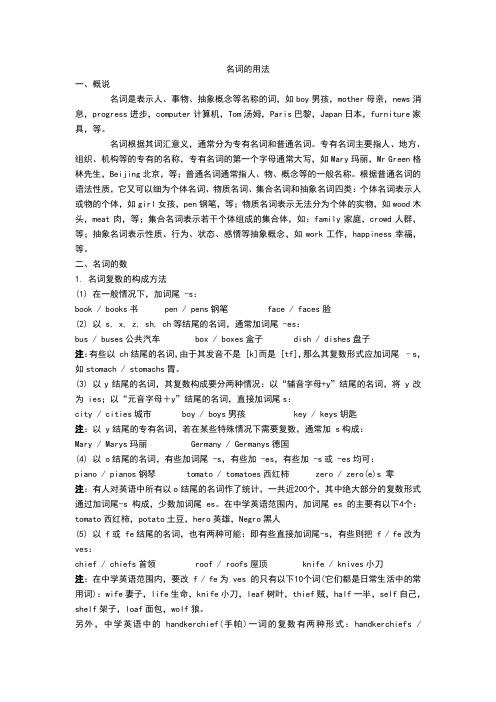
名词的用法一、概说名词是表示人、事物、抽象概念等名称的词,如boy男孩,mother母亲,news消息,progress进步,computer计算机,Tom汤姆,Paris巴黎,Japan日本,furniture家具,等。
名词根据其词汇意义,通常分为专有名词和普通名词。
专有名词主要指人、地方、组织、机构等的专有的名称,专有名词的第一个字母通常大写,如Mary玛丽,Mr Green格林先生,Beijing北京,等;普通名词通常指人、物、概念等的一般名称。
根据普通名词的语法性质,它又可以细为个体名词、物质名词、集合名词和抽象名词四类:个体名词表示人或物的个体,如girl女孩,pen钢笔,等;物质名词表示无法分为个体的实物,如wood木头,meat肉,等;集合名词表示若干个体组成的集合体,如:family家庭,crowd人群,等;抽象名词表示性质、行为、状态、感情等抽象概念,如work工作,happiness幸福,等。
二、名词的数1. 名词复数的构成方法(1) 在一般情况下,加词尾 -s:book / books书 pen / pens钢笔 face / faces脸(2) 以 s, x, z, sh, ch等结尾的名词,通常加词尾 -es:bus / buses公共汽车 box / boxes盒子 dish / dishes盘子注:有些以 ch结尾的名词,由于其发音不是 [k]而是 [tf],那么其复数形式应加词尾–s,如stomach / stomachs胃。
(3) 以y结尾的名词,其复数构成要分两种情况:以“辅音字母+y”结尾的名词,将 y改为 ies;以“元音字母+y”结尾的名词,直接加词尾s:city / cities城市 boy / boys男孩 key / keys钥匙注:以 y结尾的专有名词,若在某些特殊情况下需要复数,通常加 s构成:Mary / Marys玛丽 Germany / Germanys德国(4) 以 o结尾的名词,有些加词尾 -s,有些加 -es,有些加 -s或 -es均可:piano / pianos钢琴 tomato / tomatoes西红柿 zero / zero(e)s 零注:有人对英语中所有以o结尾的名词作了统计,一共近200个,其中绝大部分的复数形式通过加词尾-s构成,少数加词尾 es。
英语名词用法总结
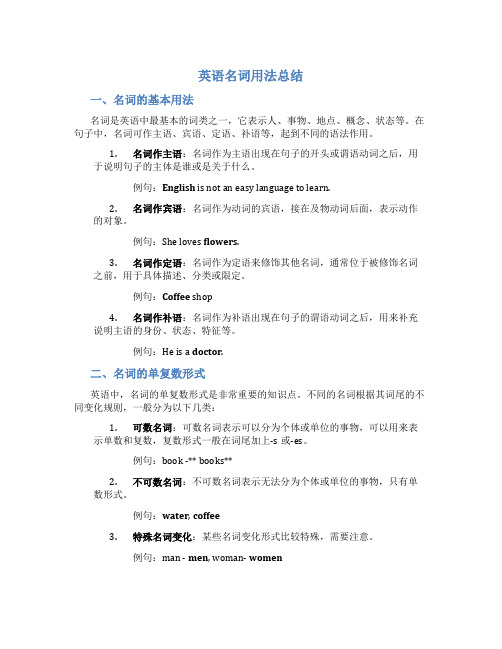
英语名词用法总结一、名词的基本用法名词是英语中最基本的词类之一,它表示人、事物、地点、概念、状态等。
在句子中,名词可作主语、宾语、定语、补语等,起到不同的语法作用。
1.名词作主语:名词作为主语出现在句子的开头或谓语动词之后,用于说明句子的主体是谁或是关于什么。
例句:English is not an easy language to learn.2.名词作宾语:名词作为动词的宾语,接在及物动词后面,表示动作的对象。
例句:She loves flowers.3.名词作定语:名词作为定语来修饰其他名词,通常位于被修饰名词之前,用于具体描述、分类或限定。
例句:Coffee shop4.名词作补语:名词作为补语出现在句子的谓语动词之后,用来补充说明主语的身份、状态、特征等。
例句:He is a doctor.二、名词的单复数形式英语中,名词的单复数形式是非常重要的知识点。
不同的名词根据其词尾的不同变化规则,一般分为以下几类:1.可数名词:可数名词表示可以分为个体或单位的事物,可以用来表示单数和复数,复数形式一般在词尾加上-s或-es。
例句:book -** books**2.不可数名词:不可数名词表示无法分为个体或单位的事物,只有单数形式。
例句:water, coffee3.特殊名词变化:某些名词变化形式比较特殊,需要注意。
例句:man - men, woman- women三、名词的所有格形式在英语中,名词的所有格形式表示所属关系。
一般在名词后面加上-apostrophe (‘)和 -s 表示单数所有格,或者在名词后面直接加上 -s 表示复数所有格。
例句:Tom’s book, the students’ books四、名词的前置修饰语名词可以被修饰,前置修饰语位于名词之前,用于进一步描述或限定名词。
常见的名词的前置修饰语包括:1.冠词:冠词包括定冠词(a, an)和不定冠词(the)。
例句:an apple, the book2.形容词:形容词用于描述名词的性质、特征等。
高中英语_名词的用法
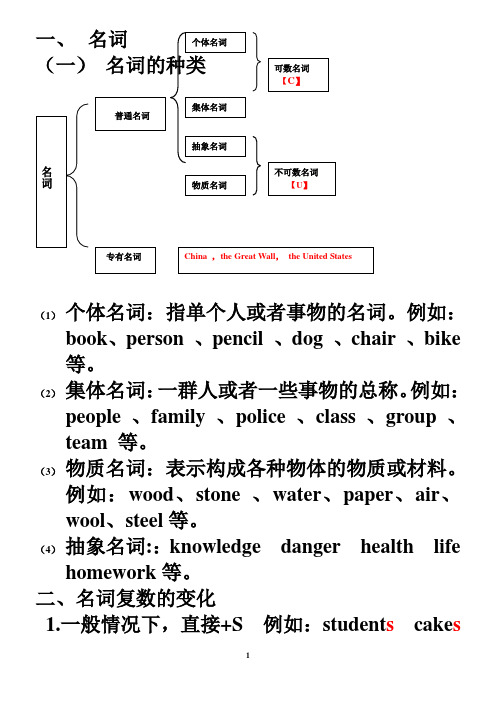
一、名词(一)(1)个体名词:指单个人或者事物的名词。
例如:book、person 、pencil 、dog 、chair 、bike 等。
(2)集体名词:一群人或者一些事物的总称。
例如:people 、family 、police 、class 、group 、team 等。
(3)物质名词:表示构成各种物体的物质或材料。
例如:wood、stone 、water、paper、air、wool、steel等。
(4)抽象名词::knowledge danger health life homework等。
二、名词复数的变化1.一般情况下,直接+S 例如:student s cake sapple s2. 以s、x、sh、ch结尾,直接+es例如:bus es box es watch es dish es但如果以–ch 结尾的名词发音为[k]时,只加–s。
stomach —stomachs 读/s/3. 以辅音字母加y结尾,把y 改为I 再加es 例如:bab y—bab ies cit y—cit ies lad y—lad ies4. 元音字母加y结尾,直接加s例如:t oy—toy s monk ey—monkey s5. 以f或fe结尾的词,把f或fe改为v,再加es 读/vz/hal f---hal ves kni fe---kni veslea f---lea ves wo lf---wol vesli fe---li ves thie f---thie ves(1)特殊:chief首领gulf 港湾cliff悬崖roof屋顶safe 保险箱(2)直接加s或者把f或fe改为v,再加es,均可:handkerchief(餐巾纸)-- handkerchiefs / handkerchieves hoof(蹄)-hoofs/hooves6. (1(2)以元音字母+o结尾,加s 读/z/ radio-radios例外:bamboo---bamboo s zoo---zoo s volcano---volcano es (火山)7. 把oo改为ee: f oo t –f ee t t oo th –t ee thg oo se-g ee se8.单复同形:Chinese fish (鱼肉) sheep deer Japanese means-means(手段、方法)另外,还有度量衡、货币等单位的名词。
名词的用法详解

名词的用法详解名词是英语中最基本的词类之一,用于代表人、事物、地方或概念等。
在英语表达中,名词的使用非常广泛,具有丰富的用法。
本文将详细解析名词的不同用法。
一、名词作为主语名词可以作为句子的主语,用来代表执行动作的人或事物。
例如:1. Dogs are loyal animals.(狗是忠诚的动物。
)2. The party was a huge success.(那个聚会是巨大的成功。
)二、名词作为直接对象名词还可以作为句子的直接对象,接受动词的直接作用。
例如:1. I bought a new book.(我买了一本新书。
)2. She loves playing tennis.(她喜欢打网球。
)三、名词作为间接对象有些动词需要搭配间接对象,而名词可以充当间接对象的角色。
例如:1. The teacher gave me some advice.(老师给了我一些建议。
)2. My parents bought us a new car.(我的父母给我们买了一辆新车。
)四、名词作为表语名词还可以作为表语,与连系动词一起描述或说明主语的状态或特征。
例如:1. The winner is a talented musician.(这位胜利者是一位有才华的音乐家。
)2. The house is a mess.(这个房子一片混乱。
)五、名词作为定语名词可以作为定语修饰其他名词。
通常情况下,名词作为定语置于被修饰名词之前。
例如:1. A car key(一把汽车钥匙)2. The school library(学校图书馆)六、名词作为补语有些动词后面需要接名词作为补语,用来指代或补充主语的内容。
例如:1. I consider him a good friend.(我认为他是个好朋友。
)2. We elected her president of the club.(我们选她为俱乐部的主席。
)七、名词的复数形式名词除了可以用单数形式表示一个人或事物外,还可以用复数形式表示多个人或事物。
英语名词的用法

一、导入:(一)名词的种类(了解)名词:表示人和事物名称的词,包括具体和抽象的概念。
可分为:专有名词和普通名词。
专有名词是指某个或某些个人、地方、机构等专有名词。
如Beijing,Tom,China等等,普通名词是指一类人或东西或是一个抽象的名称。
如:book,pen apple等。
普通名词又可以进一步分为个体名词、集体名词、物质名词和抽象名词等四类。
1.个体名词:表示某类人或东西中的个体。
如book(书),dog(狗),boy(男孩);2.集体名词:表示若干个体组成的集合体。
如family(家庭), class(班);3.物质名词:表示无法分为个体的实物。
如water(水)tea(茶)milk(牛奶)等; 4.抽象名词:表示动作、状态、品质、感情等抽象的概念。
如love(爱)peace(和平)等。
(二)、名词在句子中的成分(了解)1、作主语:The cup is beautiful.2、作表语:Mother is a doctor.3、作动词宾语或介词宾语:I am playing ball. His home is in Beijing.4、作宾语补足语:They made him monitor of the class.5、作同位语:This is Li Hua,our monitor.6、作状语:The rain lasted an hour.7、作定语:I had to buy eye drops8、称呼:Hello ,Mike!二、知识梳理(一)、名词的数(掌握)名词有可数名词和不可数名词,(以上面例子来解释)个体和集体一般为可数,物质和抽象为单数,但不是绝对的。
常考的不可数名词:advice work news furniture experience (经验,当经历时可数)可数名词在应用时有单数和复数的区别,表示一个用单数,两个以上用复数,名词复数的构成有以下规则1、一般在词尾直接加s,在元音或浊辅音后读【z】,如plays;在清辅音后读【s】,如cups;在t后读【ts】,如hats;在d后读【dz】,如beds2、以s,x,sh,ch结尾的名词,通常在词尾加es,读【iz】,如bus-buses,box-boxes,brush-brushes,watch-watches3、以元音字母+y结尾的加s,读【z】,如boys,以辅音字母+y结尾的名词,把y变为i,再加es,读【iz】如body-bodies4、以f,fe结尾的名词,把f,fe变为v,再加es,读【iz】,如thief-thives,knife-knives例外:roof-roofs,scarf-scarfs/scarves,proof-proofs,chief-chiefs,belief-beliefs,5、以o结尾的词,一般加es;特例加s,都读【z】,如,negro-negroes ,hero-heroes,tomato-tomatoes,potato-potatoes ,黑人英雄爱吃土豆西红柿,例外:zoo-zoos,radio-radios,piano-pianos(外来词),photo-photos(缩写词)6、名词复数的不规则变化man-men,woman-women,child-children,foot-feet,tooth-teeth,mouse-mice7、单复数形式相同的名词sheep,deer,Chinese,Japanese,fish(fish,fishes)8、词尾加en,读音改变如:ox-oxen/oksn/9、表示“某国人”的名词遵循以下原则中日不变,如Chinese-Chinese,Japanese-Japanese英法变,如Englishman-Englishmen,Frenchman-Frenchmen其他s加后面,如American-Americans,German-Germans9、复合名词的变法an apple tree(some apple trees), a girl student(some girl students)例外:a woman teacher(some women teachers),a man teacher(some men teachers)10、合成词的单复数:将主体词变为复数,规则同上如new-comer(new-comers),pencil-box(pencil-boxes)11、只有复数形式的名词:people,police;cattle;trousers,glasses,thanks,clothes12、只有单数形式的名词:furniture;13、根据意义确定单复数的名词如:family指“家庭”时,强调全体,如My family is a big one.;指“家里人”时强调个体,如:My family are having supper now.14、有些名词加s后,读音会发生变化,读【z】,如bath -baths ,mouth-mouths ,path-paths15、初中常见名词后加复数考点:tips suggestions decisions inventions results experiences(经历) mistakes wishes choices challenges chances sights views scenes differences specials(特色菜)(二)、修饰名词的词(掌握)1.只能修饰可数名词复数的词数词many,several,a few,few,a (large)number of,如:two apples两个苹果,a large number of students许多学生,several books几本书2.只能修饰不可数名词的词much,a little,little,a great deal of,如much water 许多水,a little time一点儿时间3.既能修饰可数名词复数又能修饰不可数名词的词some,any ,a lot of,lots of,plenty of,表示容器的量词,如a lot of books 许多书,a lot of milk 许多牛奶,two boxes of apples 两箱苹果,three cups of tea 三杯茶(三)、名词的所有格(重点难点)名词的格分为普通格和所有格(通格和属格),通格分为主格和宾格,做主语的是主格,做宾语的是宾格。
英语名词的分类与用法

英语名词的分类与用法名词是英语语法中的一大类词汇,用来表示人、事、物、地点等。
在英语中,名词可以根据其性质和用途进行分类。
本文将介绍英语名词的分类以及它们的常见用法。
一、可数名词和不可数名词可数名词(countable nouns)是可以单独使用并且可以数的名词,可以用来表示单数和复数。
比如:"book"(书)是一个可数名词,我们可以说 "one book"(一本书)或 "three books"(三本书)。
不可数名词(uncountable nouns)则是无法用数字来计数的名词,它们通常表示抽象概念、物质或集合。
比如:"water"(水)是一个不可数名词,我们只能说 "some water"(一些水)或 "a glass of water"(一杯水)。
二、单数名词和复数名词单数名词(singular nouns)表示一个人、物或概念。
例如:"cat"(猫)、"table"(桌子)。
复数名词(plural nouns)表示多个人、物或概念。
例如:"cats"(猫们)、"tables"(桌子们)。
一般情况下,为了将可数名词变成复数形式,我们在名词末尾加上"s"。
但也有一些不规则名词,它们在复数形式上有不同的变化规则。
比如:"child"(孩子)的复数形式是 "children"(孩子们),"man"(男人)的复数形式是 "men"(男人们)。
三、名词的用法名词在句子中可以担当主语、宾语、定语或补语的角色。
接下来将详细介绍名词在不同语法位置上的使用。
1. 名词作主语名词可以作为主语开头使用,来指代句子的主要内容。
英语名词的用法归纳
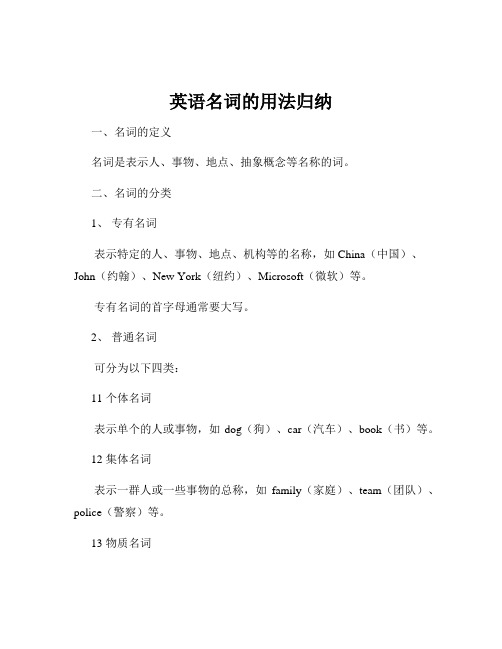
英语名词的用法归纳一、名词的定义名词是表示人、事物、地点、抽象概念等名称的词。
二、名词的分类1、专有名词表示特定的人、事物、地点、机构等的名称,如 China(中国)、John(约翰)、New York(纽约)、Microsoft(微软)等。
专有名词的首字母通常要大写。
2、普通名词可分为以下四类:11 个体名词表示单个的人或事物,如 dog(狗)、car(汽车)、book(书)等。
12 集体名词表示一群人或一些事物的总称,如family(家庭)、team(团队)、police(警察)等。
13 物质名词表示无法分为个体的物质或材料,如 water(水)、air(空气)、wood(木材)等。
14 抽象名词表示抽象的概念、性质、状态、情感等,如 love(爱)、happiness (幸福)、knowledge(知识)等。
三、名词的数1、可数名词有单数和复数形式。
单数名词表示一个,复数名词表示两个或两个以上。
复数形式的构成规则:11 一般在词尾加 s,如 book books,dog dogs。
12 以 s,x,ch,sh 结尾的名词,加 es,如 bus buses,box boxes,watch watches,dish dishes。
13 以“辅音字母+y”结尾的名词,变 y 为 i 再加 es,如 city cities,baby babies。
14 以 o 结尾的名词,有生命的加 es,无生命的加 s,如 tomato tomatoes,photo photos。
15 以 f 或 fe 结尾的名词,变 f 或 fe 为 v 再加 es,如 knife knives,leaf leaves。
不规则复数形式,如 man men,woman women,child children,foot feet,tooth teeth 等。
2、不可数名词没有复数形式。
表示物质或抽象概念的不可数名词,在表示数量时,要用“数词+表示量的名词+ of +不可数名词”的结构,如 a piece of paper(一张纸),a cup of coffee(一杯咖啡)。
- 1、下载文档前请自行甄别文档内容的完整性,平台不提供额外的编辑、内容补充、找答案等附加服务。
- 2、"仅部分预览"的文档,不可在线预览部分如存在完整性等问题,可反馈申请退款(可完整预览的文档不适用该条件!)。
- 3、如文档侵犯您的权益,请联系客服反馈,我们会尽快为您处理(人工客服工作时间:9:00-18:30)。
一、英语中各种词性得用法及解释1、名词名词可以分为专有名词(Proper Nouns)与普通名词 (mon Nouns)。
专有名词就是某个(些)人,地方,机构等专有得名称,如Beijing,China等。
(不就是专有名词就就是普通名词)(1)名词变复数得方法1)规则得变复数得方法①以o 结尾得名词,变复数时:a、加s,如: photo---photos piano---pianos radio---radioszoo---zoos;b、加es,如:potato—potatoes tomato—tomatoes(基本规律:有生命性质得词在后面加es,否则加s)②以f或fe 结尾得名词变复数时:a、加s, 如: belief---beliefs roof---roofs safe---safesgulf---gulfs;b、去f, fe 加-ves,如:half---halves knife---knives leaf---leaveswolf---wolves wife---wives life---lives thief---thieves;③名词复数得不规则变化child---children foot---feet tooth---teeth mouse---miceman---men woman---women④单复同形如:deer,sheep,fish,Chinese,Japanese集体名词,以单数形式出现,但实为复数。
如: people police cattle 等本身就就是复数,不能说 a people,a police,acattle,但可以说a person,a policeman,a head of cattle, the English,theBritish,the French,the Chinese,the Japanese,the Swiss 等名词,表示国民总称时,作复数用。
⑤以s结尾,仍为单数得名词,如:⑥maths,politics,physics等学科名词,为不可数名词,就是单数。
news 就是不可数名词。
(2)名词得格1)在英语中有些名词可以加"'s"来表示所有关系,带这种词尾得名词形式称为该名词得所有格,如:a teacher's book。
名词所有格得规则如下:2) 单数名词词尾加"'s",复数名词词尾没有s,也要加"'s",如the boy's bag男孩得书包,men's room 男厕所。
3) 若名词已有复数词尾-s ,只加"'",如:the workers' struggle工人得斗争。
4)凡不能加"'s"得名词,都可以用"名词+of +名词"得结构来表示所有关系,如:the title of the song 歌得名字。
5)在表示店铺或教堂得名字或某人得家时,名词所有格得后面常常不出现它所修饰得名词,如:the barber's 理发店。
6)如果两个名词并列,并且分别有's,则表示"分别有";只有一个's,则表示'共有'。
如:John's and Mary's room(两间)John and Mary's room(一间)例题解析1、 They got much _____ from those new books、A、 ideasB、 photosC、 newsD、 stories2、 I have two _______ and three bottles of _________ here、A、 orange, orangeB、 oranges, orangesC、 oranges, orangeD、 orange, oranges3、 Every evening M r、 King takes a _________ to his home 、A、 25 minutes’ walkB、 25 minute’s walkC、 25 minute walkD、 25 minutes walk解析: 句中得 minute应该用其复数得所有格形式,只+’,而不能+s,因此选A。
4、 An old _______ wants to see you、A、 peopleB、 personC、 the peopleD、 the person解析: person 与people 都有”人”得意思, 但用法不同、“一个人”用“a person”, “两个人”用“two persons”; people 泛指“人们”就是集合名词,表示复数, the people 指“人民”, a people 指“一个民族”、应选B。
5、 Help yourself to __________、A、 chickens and applesB、 chickens and appleC、 chicken and appleD、 chicken and apples解析: chicken 可用作可数名词指小鸡,用作不可数名词指鸡肉,根据词题意应理解为鸡肉;apple为可数名词, 故应+s, 因此选D。
6、 Oh, dear、 I forgot the two _________、A、 room’s numberB、 rooms’ numberC、 room numbersD、 rooms’numbers解析: room number 房间号码、 room可直接用作定语修饰后面得名词、类似得还有my phsics teacher,two bus drivers 等、应选C。
7、 She has been in Tianjin for ten years、 Tianjin has bee her second _________、A、 familyB、 houseC、 homeD、 room解析: family指得就是家庭或就是家庭成员; house指得就是房子(住所); room 指得就是房间;而home 指得就是家, 因此选C、8、 ________ mothers couldn’t go to the meeting, because they have gone to Shanghai 、A、 Mary and Peter’sB、 Mary and PeterC、 Mary’s and PeterD、 Mary’s and Peter’s解析: 此句中“mothers”就是复数,表示两个人各自得母亲,因此应选D。
9、 Li Lei has been to __________ many times this month、A、 her uncleB、 her uncle’sC、 her unclesD、 aunt’s 解析: 此句意为“李雷这个去她舅舅家多次”、表示具体场所时, 可省去所有格后面得名词、因此选B。
10、 He is a success as a leader but he hasn’t ________ in teaching、A、 many experiencesB、 much experienceC、 an experienceD、 a lot experience解析: experience 作“经验”讲时就是不可数名词, 作“经历”讲时就是可数名词、本句中应理解为“经验”,因此就是不可数名词,排除 A C、又因 a lot of , lots of, plenty of 只用于肯定句, 不用于否定句, 因此选B。
11、 A classmate of _________ was here ten minutes ago、A、 youB、 yourC、 your sisterD、 your sister’s解析: 此题考查名词得双重所有格、应选D。
12、 A group of _________ are talking with two ___________、A、 Frenchmen, GermansB、 Germans ,FrenchmansC、 Frenchmans , GermenD、 Germen , Frenchmen解析: Frenchman 就是复合词,其复数形式为 Frenchmen; German 得复数为直接在单词末尾+S, 应选A、13、The team ________ having a meeting 、A、 isB、 areC、 amD、 be解析: team 就是一个集合名词,即可表示复数意义(指整个小组) , 也可指小组中得成员(表示复数), 此题意为后者, 因此选B。
14、“Would you like _________?”“________, please、”A、 drink, Three coffeesB、 a cup of drink, CoffeesC、 a drink, A coffeeD、 a drink, Three cups of coffees解析: drink 与coffee就是不可数名词, 可以用…of来表示数量, eg, three cups of coffee,当前面加a 时,则表示“一杯”.因此选C。
15、 The Great Wall was made not only by _______, but also the flesh and blood of ________ men、A、earth and stone, millions ofB、 earths and stones, millionsC、 the earth and stone, million ofD、 the earths and stones, millions 解析:earth 就是不可数名词,因此删除B D,数以百万得应为millions of 、因此选A。
选择最佳答案:1. Last night, there was a food accident、 The _______ were ill, but no _______ were lost、A、 child, livesB、 children, lifeC、 children, livesD、 child, life2、 ---This is a photo of _________ when they were young、---OK, how happy they both looked!A、 my father and motherB、 my mother and father'sC、 my mother's and father'sD、my father's and my mother3、 The new student is in __________ , Grade Two、A、 Class ThirdB、 Third ClassC、 Class ThreeD、 Three class4、 Today is September 10th、 It's __________ Day、 Let's go and buy some flowers for our teachers、A、 TeachersB、 Teachers'C、 the Teachers'D、 Teacher's5、 The market isn't far from here、 It's only _________ bicycle ride、A、half an hours'B、 half an hour'sC、 half an hourD、 an hour and a half6、 --- What would you like to drink, girls?--- _________, please、A、Two cup of coffeeB、 Two cups of coffeC、 Two cups of coffeeD、 Two cups of coffees7、During Christmas, people get together and sing Christmas songs for _________、A、 funB、 wishesC、 interestD、 thanks8、 Some _________ are flying kites near the river、A、 childB、 boyC、 boysD、 childs9、 After the exam, we'll have________ holiday、A、 two weeksB、 two-weeksC、 two weeks'D、 two week's10、 They are those _________ bags、Please put them on the bus、A、 visitorB、 visitorsC、 visitor'sD、 visitors'11、--- How many workers are there in your factory?--- There are two ___________、A、 hundredsB、 hundredC、 hundred ofD、 hundreds of12、 ---What do you think of the _______ the Moonlight Sonata by Beethoven? --- It sounds really wonderful、A、 subjectB、 musicC、 bookD、 animal13、 There is not enough _________ in the corner for the fridge、A、 placeB、 roomC、 fieldD、 ground14、 _________ es from sheep and some people like eating itA、 WoolB、 PorkC、 MuttonD、 Milk15、 If you don't take more ________, you'll get fat、A、 medicineB、 lessonsC、 photosD、 exercise16、 My school is about twenty ________ walk from here、A、 minuteB、 minutes'C、 minutes'sD、 minutes17、 Mum, I have _______ to tell you!A、 a good newsB、 some good newsC、 some good newesD、 much good news18、 Which is the ________ to the post office?A、 streetB、 wayC、 roadD、 address19、 I stayed at ________ last Sunday、A、 my unclesB、 my uncles'C、 my uncle'sD、 my uncle's family20、 Maths ________ not easy to learn、A、 areB、 isC、 amD、 were1-5 CBCBB 6-10 CACCD 11-15 ABBCD 16-20 BBBC2、形容词A“How can I learn English well?” This is a question many students ask、In my opinion, the most effective way is to learn lessons by heart、 If you can recite the text and write it out, you’ve learned it fairly well、 And if you can tell, in your own words, what the lesson says you’re a very successful learner indeed、 Your English will be quite perfect、This is a difficult task、 However, if you try to learn by heart only part of each lesson, you’ll find it not half so hard as you might have thought、Learning this way, you will make rapid progress、 Of course, writing is also necessary、 It helps you a lot on our way to success in English、Equally important is to feel the language、 You should be able to laugh at jokes and be shocked at bad news、 When using English, try to forget yourmother tongue、 Instead of helping you, your own language gets in your way、So, never try to see English through translation、1、In the writer’s opinion, the most effective way in learning English is ____、A、to practise speaking, writing and feeling itB、to forget your own native languageC、to translate everything into his own languageD、to memorize the English words and grammatical rules2、“Instead of helping you, your own language gets in your way、”This sentence means that memorizing your own language can ________、A、help you to study English wellB、stop you mastering EnglishC、make English easy to learnD、help you notice mistakes3、Equally important is to feel the language、“to feel the language”here means________、A、to get a knowledge of English by touchingB、 to be able to read and write EnglishC、to translate English into your own by imaginingD、to be able to experience the rich sensation of the languageBWhen we can see well, we do not think about our eyes often、 It is only when we can not see perfectly that we e to see how important our eyes are、People who are nearsighted can only see things that are very close to their eyes、 Many people who do a lot of close work, such as writing and reading, bee nearsighted、 Then they have to wear glasses in order to see distant things clearly、People who are farsighted face just the opposite problem、 They can see things that are far away, but they have difficulty reading a book unless they hold it at arm’s length、 If they want to do much reading, they must get glasses too、Other people do not see clearly because their eyes are not exactly the right shape、 This, too, can be corrected by glasses、 Some people’s eyes bee cloudy because of cataracts、 Long ago these people often became blind、 Now, however, it is possible to operate on the cataracts and remove them、When night falls, colors bee fainter to the eyes and finally disappear、After your eyes have grown used to the dark, you can see better if you use the side of your eyes rather than the centers、 Sometimes, after dark, you see a small thing to one side of you, which seems to disappear if you turn your head in its direction、 This is because when you turn your head, you are looking? at the thing too directly、 Men on guard duty sometimes think they see somethingmoving to one side of them、 When they turn to look straight at it, they can not see it any more, and they believe they were mistaken、 However, this mistake happens because the center of the eye, which is very sensitive in daylight, is not as sensitive as the sides of the eye after dark、1、We don’t know that our eyes are of great importance until ________、A、 we think about our eyesB、 we cannot see clearlyC、 we wear glassesD、 we have to do much reading2、According to the passage, a ________ is more likely to be nearsighted、A、tailorB、 doctorC、 guardD、painter3、People who are farsighted ________ 、A、cannot do a lot of close work without glassesB、can only see things that are very close to their eyesC、have difficulty reading a book if they hold it at arm’s lengthD、have the same problem as the nearsighted people4、To see a small thing at night, it is better to look ________ 、A、with wide open eyesB、with half shut or narrowed eyesC、straight at itD、in a slightly different directionCTrees are useful to man in three important ways: they give him wood and other useful things, they give him cool places, and they help to stop drought and flood、Unluckily, in many parts of the world, man has not found that the third of these points is the most important、 Man wants to make money from trees,so he has cut them down in large numbers, only to find that without them he has lost the best friends he had、 And also, he is usually too careless to plant and look after new trees、 So the forests slowly disappear、This does not only mean that man will have fewer trees、 The results are even worse: for where there are trees, their roots break up soil-make the rain in-and also bind the soil, thus stopping it from being washed away easily; but where there are no trees, the rain falls on hard ground and flows away, causing floods and carrying away the rich top-soil、 When all the top-soil is gone, nothing is left but useless desert、1、The most important points of trees to man is ________、A、they help him to make moneyB、they give him coolC、they give him wood and other thingsD、they help him to stop drought and floods2、In many places forests slowly disappear because ________ 、A、many trees have been cut down by manB、new trees are not well looked afterC、man has not paid enough attention to planting treesD、all the above3、Land bees desert after all trees are cut down because ____A、 roots of trees break up the soilB、 there are too many rainfallsC、 strong winds bring a lot of sandD、 there are no longer trees to keep the rain and protect the top-soil、4、Which title best fits the passage?A、Trees and ManB、The Function of Tree WoodC、How do People do with Trees?D、The Usage of Tree Roots英语完形填空练习These days puter games have bee more and more popular in many cities and towns、 A lot of small shops along busy _1_ have changed into puter game housesin order to get more __2___ 、 These places are always crowded with people、In the puter game houses, people 3 a lot of money matching on the machines, It's 4 for one to beat a puter, but one can do well after trying again and again、 People want to 5 when they play puter games、The more they 6 , the more they want to win, and at last they even can't 7 without it、The result is that some people don' t want to 8 and they play in puter game houses for hours and hours、 For school boys, things are 9 、 They don't want to have 10 、 When school is over, they rush to the puter game houses near their 11 、Some of them can get enough money from their 12 、 Some of them are_13_enough to get the money、 So they have to steal or rob others' and bee 14 、puter game addiction(上瘾) is a 15 problem in our life、 Something has tobe done to stop it、( )1、 A、 streets B、 schools C、 towns D、cities( )2、 A、 boys B、 money C、 puters D、 houses( )3、 A、 take B、 spend C、 cost D、 pay( )4、 A、 possible B、 easy C、 good D、hard( )5、 A、 read B、 learn C、win D、download( )6、 A、 lose B、 try C、 waste D、 watch ( )7、 A、 e B、 eat C、 study D、 live( )8、 A、 watch TV B、 go out C、 stay there D、 work ( )9、 A、 better B、 exciting C、even worse D、interesting( )10、A、 lessons B、 games C、 families D、 sports( )11、A、 classes B、 rooms C、 schools D、 shops ( )12、 A、 classmates B、 teachers C、 sisters D、parents( )13、 A、 lucky B、 unlucky C、 careful D、polite( )14、 A、 good B、 bad C、 rich D、 poor ( )15、 A、 important B、 serious C、 unusual D、wonderful1、 1-5 ABBDC 6-10 ADDCA 11-15 CDBBB。
